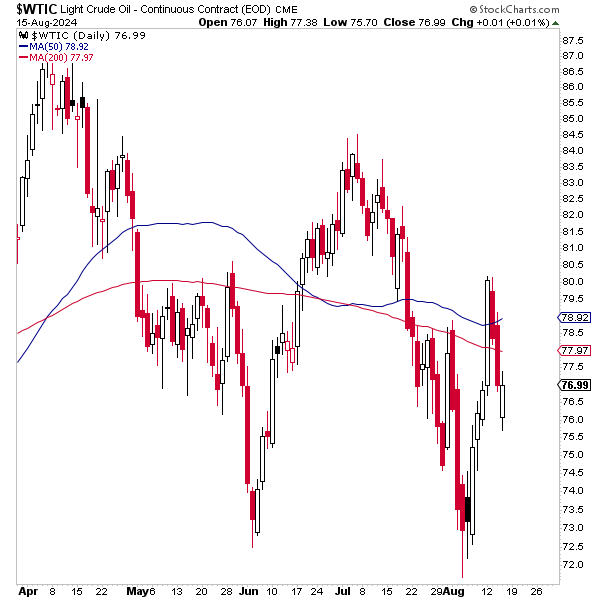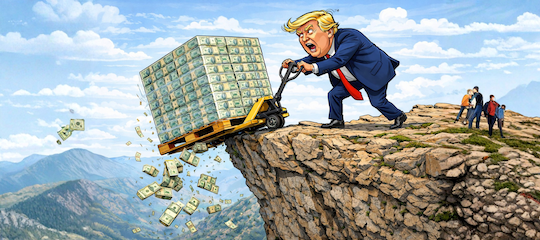Posted August 16, 2024
By Sean Ring
Drill, Baby, Drill!
Good morning, once again, from beautiful Wroclaw, Poland. It’s been delightful here. As yesterday was a public holiday, I had time to wander around the city with Pam and Micah and read some of the mailbag.
Before getting into the bag, I want to wish Philosopher-Truck Driver John Ring the happiest birthday! He’s a ripe 82 years young today. Sorry we’re not home, but we’ll celebrate when we return to Italy.
Ok, here we go. Good friend and Head of Paradigm Press’s Director of Customer Experience, Dustin Weisbecker, sent me this message urgently to make sure I answer it:
Can’t seem to get any response from PP for my question about drill-baby-drill resulting falling oil and natural gas prices ( and nice consumer impacts) versus what the heck it’s going to do to the energy recommendations made by all of PP’s analysts? Can anybody out there write about this a bit, or did I miss it? Seems that this should be a big concern for all PP subscribers. And analysts. Trump is talking about reducing the cost of energy by at least 50 percent within 12-18 months when taking office.
Jim T.
Jim T., I hope this message finds you well. As you're aware, I don’t typically recommend single stocks in the Rude unless I’m personally investing in them. However, I can certainly address your question in a more general sense.
Trump’s Drilling, Baby!
“Drill, baby, drill” goes back to the 2008 Presidential campaign, when John McCain and Sarah Palin topped the Republican ticket.
When Palin debated Joe Biden in the Vice Presidential debate, Biden said that McCain thinks "the only answer is drill, drill, drill. Drill we must, but it will take ten years for one drop of oil to come out of any of the wells that are going to be drilled."
Palin retorted, "The chant is 'drill, baby, drill.' And that's what we hear all across this country in our rallies because people are so hungry for those domestic sources of energy to be tapped into."
Trump repeatedly used the line during this campaign, especially during his acceptance speech for the Republican nomination.
What May Happen
Donald Trump's "drill baby drill" policy, which emphasizes increased domestic oil and natural gas production, is positioned as a strategy to lower energy prices and enhance energy independence.
However, the impact of such a policy on oil and natural gas prices and energy companies is complex. What follows is my best guess.
Impact on Oil and Natural Gas Prices
As you mentioned, Jim, Trump claims that ramping domestic drilling will lead to a YUGE decline in energy prices. But by 50%? That’s a bold call, indeed.
Trump argues that increased production would lower consumer costs and reduce inflation, which he attributes to high energy prices.
During his presidency, oil prices were relatively low, with West Texas Intermediate (WTI) crude oil averaging below $60 per barrel for much of his term.
Right now, we’re trading in the mid-70s. Simply put, Trump should attribute inflation to reckless fiscal policy rather than high energy prices.

Despite Trump's assertions, the U.S. has already achieved record levels of oil production under Joke Biden, averaging 12.9 million barrels per day in 2023, surpassing previous records. Increasing drilling may not have the immediate effect that Trump anticipates on prices. In fact, Paradigm Press Grand Poobah Matt Insley often tells me he thinks the already YUGE US supply is dampening oil prices rather than a grim economic outlook.
Oil and gas prices are influenced by global supply and demand dynamics, geopolitical factors, and OPEC's production decisions. Even with increased domestic production, if global demand remains high or geopolitical tensions disrupt supply chains, prices may decrease less than Trump expects. For example, if Putin and MBS decide to get together and cut production, prices will soar no matter what the U.S. does.
Impact on Energy Companies
Energy companies will see a boost in production activities, increasing revenues in the short term. Companies involved in drilling and production will benefit from reduced regulatory constraints and increased investment in fossil fuel projects.
However, the long-term sustainability of such a boom is yet to be determined. The energy sector has faced volatility, and a significant increase in production could lead to oversupply, which has historically resulted in price drops and financial strain on smaller companies.
Trump's rollback of environmental regulations will undoubtedly facilitate increased drilling. Of course, the watermelons – green on the outside, commie red on the inside – will start legal proceedings, impacting operational costs and public perception of energy companies.
Get Long Here
Energy Sector
Oil and Gas Companies: Increased domestic drilling will likely boost the revenues of oil and gas extraction companies, such as major producers and independent operators. This sector could see enhanced profitability due to higher production levels, especially if global oil prices stabilize or increase due to reduced regulatory constraints on exploration and drilling. These companies are analogous to the people panning for gold in 1849.
Energy Equipment and Services: Companies that provide drilling equipment and services, including engineering and consulting firms, are expected to benefit from increased demand as drilling activities ramp up. These companies are analogous to the shovel sellers of the gold rush in 1849.
Industrial Sector
Manufacturing and Construction: The policy will increase infrastructure development, particularly in energy-related projects such as pipelines and refineries. This could benefit construction firms and manufacturers of industrial equipment.
Steel and Materials: As energy companies expand their operations, there will be a heightened demand for steel and other construction materials.
Financial Sector
Banks and Financial Services: With increased activity in the energy sector, financial institutions that provide loans and financing to energy companies may see a boost in business. Higher interest rates could also enhance their profit margins, benefiting this sector.
Sectors to Short
Renewable Energy
Solar and Wind Energy Companies: The Trump 47 administration's increased focus on fossil fuel production will probably divert investments away from renewable energy sources. Companies in the solar and wind sectors will get less funding and support, hindering their growth and development as the administration prioritizes oil and gas.
Electric Vehicle (EV) Manufacturers: Trump's intention to repeal the EV mandate and reduce incentives for electric vehicles could adversely affect EV manufacturers. This sector has been rapidly growing, and a shift back to fossil fuels could stifle innovation and market expansion.
Environmental Services, Advocacy, and Finance
Environmental Consulting Firms: Companies that provide environmental assessments and compliance services may see a decline in demand as regulations on drilling and emissions are rolled back. This will reduce business opportunities and revenue for firms focused on sustainability.
Non-Profit Organizations: Environmental advocacy groups will face challenges in promoting clean energy and combating climate change. A shift towards fossil fuels could undermine their initiatives and funding.
Green Investment Funds: Funds focused on sustainable and green technologies will see capital flows shift out of their backyard into fossil fuel projects.
Wrap Up
Jim T., thanks for the question. I hope I have answered it sufficiently.
Have a great weekend!

My Secret to Finding Great Miners… and Avoiding Promoters
Posted February 03, 2026
By Matt Badiali

The Massacre of the Innocents
Posted February 02, 2026
By Sean Ring

METALS MELTDOWN!
Posted January 30, 2026
By Sean Ring

Trump’s Victory at Sea
Posted January 29, 2026
By Byron King

